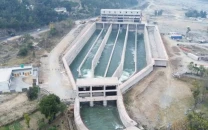An unhealthy state: ‘Lack of progress on reproductive health rights of young mothers’
Seminar cites lack of access, services and awareness as reasons for dismal state of affairs.

Seminar cites lack of access, services and awareness as reasons for dismal state of affairs. PHOTO: FILE
Addressing participants, the author of a report on reproductive health in Pakistan (secondary data 2001-2011), Dr Rehan, said many adolescents and young mothers in Pakistan are pushed into early marriage and pregnancies, resulting in high rates of maternal and infant mortality and morbidity.
Adolescent girls face a number of challenges in accessing essential healthcare due to restrictions on mobility, low availability of services, lack of financial resources and limited information and awareness, said Rehan.
He explained the situation is worse for ethnic and religious minorities and those living in remote and feudal areas. The reproductive and sexual health needs of young women between the age of 15-24 remain unacknowledged and are conspicuously absent in major government policies such as the National Health Policy 2009 and the National Youth Policy 2008.
Dr Rehan explained that a research conducted over the last decade to assess the state of sexual and reproductive health and rights of young people in Pakistan indicates that activists have not been able to achieve any significant results at the policy level. This holds true for the issue of unsafe abortions, contraception and sexuality, said the author.
Rehnuma Regional Director Dr Gohar Zaman said CARE International and its partners are conducting a research and advocacy project in which officials at various levels of the government will be engaged to increase their commitment to policy formulation and resource allocation for sexual, reproductive, maternal and neonatal health needs of marginalised adolescent girls and young mothers.
Adviser to Khyber-Pakhtunkhwa Chief Minister Meher Taj Roghani said the majority of early marriages occur in remote areas of the province and appealed to clerics, social workers, NGOs and the media to create awareness among people about the dangers of early marriages.
She said the domestic violence bill was almost ready and will be tabled in the provincial assembly soon. Another bill on the internal trafficking of girls was also being prepared.
Published in The Express Tribune, April 23rd, 2014.













COMMENTS
Comments are moderated and generally will be posted if they are on-topic and not abusive.
For more information, please see our Comments FAQ